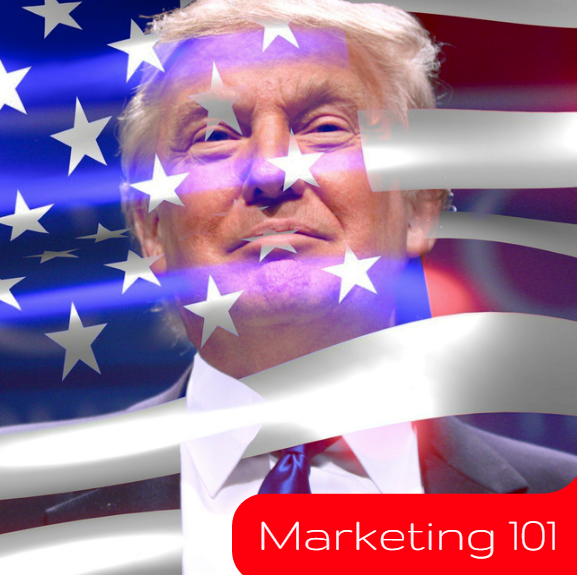Trump Marketing 101
Lessons To Learn from the Trump Campaign
Few hot button topics have been as “hot” in recent memory as the 2016 Presidential Election. Whether you’re excited about “Making America Great Again” or you’re “Still With Her”, nearly everyone in America can agree on one point:
Donald Trump knows a thing or two about marketing.
Whether or not you support the politics of Donald Trump the person, there is a lot to be learned from his presidential campaign from a marketing perspective. Experts will likely be studying his campaign successes (and weaknesses) for decades to come, particularly given that his campaign spent far less money to win the election than any in recent history. Political philosophy aside, how did he do it?
What lessons can every marketer take away from Trump’s unlikely win?
Marketing Lesson: Your Slogan Matters
Every political campaign has a slogan. From Obama’s memorable, “Yes We Can!” to Hillary’s forgettable, “Stronger Together,” campaign slogans are meant to both identify the overarching feel of the candidate and, hopefully, inspire his or her followers.
Trump’s campaign struck a chord. “Make America Great Again!” is both memorable and simple; it’s short, to the point, and implies a lot of things about how the candidate himself views the world. Hillary’s slogan was just two words: “Stronger Together.” Not only was it a little bland and way too broad, it was easy to mess up. Even Bill Clinton himself misspoke it, saying “Better Together” at one of the campaign’s rallies! While Hillary’s inclusive message was a feel-good one, it didn’t speak to change. Trump’s did, and thus held more meaning for more people. Also, it made for some really hard-to-ignore hats.
The lesson here? People have short attention spans in the age of the internet. Your message has to be short, memorable, and easily identifiable as your own. If you have a choice between slightly controversial and boring, know that the more inflammatory messaging will likely be easier to recall, for better or for worse.
Marketing Lesson: Keep Your Message Clear
If we asked you right now to identify the three key points of each candidate’s message – especially after all the campaign talk of the last few weeks! – could you? Even Hillary’s most ardent supporters had trouble articulating her main campaign “promises” as bullet points. In fact, the closer the election got the more muddled Hillary’s messaging became. She had to spend more time telling voters why they shouldn’t vote for Trump and spent less time making clear what her own campaign stood for.
Trump’s campaign rhetoric, conversely, was very simple: Build a Wall, Reform Taxes, and Repeal/Replace Obamacare. These are very straightforward, tangible campaign promises. His advocates and his opponents could easily summarize his platform…and that proved to be a powerful motivator for votes.
The lesson here? Your message should be unambiguous, and it should be your own. Don’t orient your business against another business – a competitor or a predecessor – tell consumers what you’re for, what you do, and why they should choose you, not why they shouldn’t choose someone else.
Marketing Lesson: Identify Your Competitor’s Achilles’ Heel
During the campaign, almost on a daily basis, news media would announce they next terrible thing that Trump had said or done. After almost two years of this noise, people started to tune it out. Donald Trump’s brand had become so saturated with “bad” news, none of it stuck anymore! At a certain point, his campaign realized they had to go on the offensive and chose to focus on a few key weaknesses in Clinton’s campaign and candidacy. Trump focused on Clinton’s email scandal and the Benghazi affair and hammered the message over and over and over again. In this way the sins of the Clinton candidacy became easier to enumerate than those of Trump’s! There is such a thing as too much press.
The lesson here? Companies often highlight competitor weaknesses, which isn’t a bad strategy. The point is to keep it concise and consistent. Don’t pick something new to moan about every month. Instead, focus on one or two ways a competitor is inferior and make those stick.
Marketing Lesson: Go Where Your Customers Are
Never let someone tell your business you’ve got no chance to break into a market. It’s possible…just ask Pennsylvania, Wisconsin, and Ohio! Trump’s campaign held many more rallies and targeted areas where he knew he had a chance of pulling an upset and even went to some states where he was leading in the polls. He didn’t listen when pollsters and experts told him he was wasting his time, and the votes proved him right.
This personal access for his supporters at his rallies help to energize his base and they enthusiastically recruited others to support Trump. This access and personal presence went a long way. In some ways, the Trump campaign made “ignored” areas feel once again included in the political process, causing a fruit-basket turnover at the polls.
The lesson here? Set goals, then go for them. Don’t spend too much time worrying over how difficult they’ll be to achieve, just take it one day and step at a time. Every Apple and Coca Cola had to start somewhere.
Marketing Lesson: Money Isn’t Everything
Hillary Clinton and Jeb Bush’s war chests were gigantic. They had the financial backing of super-pacs and big-money donors, but in the end, none of it mattered. Not the millions spent on national commercials, not the full-page newspaper ads, not the giant billboards and huge donor dinners. Trump has used weapons that were virtually free: Facebook and Twitter.
Social Media and the power of digital marketing is changing the way politics works in America. Never before has a candidate harnessed the power of Twitter followers and Facebook Likes to achieve such a feat. The Trump campaign used online marketing brilliantly, if not always perfectly. Although the candidate himself made missteps at times by being too inflammatory or reactionary, voters appreciated his candidness and the unparalleled access they felt they were getting. Trump (and, more likely, his team) realized the vast power of digital marketing early on. He even purchased JebBush.com and redirected the website to his own!
The lesson here? Traditional media buys aren’t everything. They’re expensive, increasingly segmented, and consumers are savvier than ever before when it comes to being “sold.” They’re looking for authenticity and communication with the brands they patronize, and social media is low-hanging fruit.
It’s hard to position Donald Trump as the “David” in a David vs. Goliath scenario with a straight face, but in many ways his candidacy should have been doomed from the start. Traditional marketing is changing – both commercially and in politics! – and smart marketers have to keep up.
Small and mid-sized businesses have renewed hope when going up against larger established business. A consistent brand message and creative internet marketing strategies can help them compete and win against known consumer brands. Having a holistic PR, Social Media , Email Marketing and Web Marketing campaign means reaching targeted audiences for relatively reasonable budget. Technology has evened the playing field.
There are, of course, hundreds of sociological and political factors that led to Trump’s unpredictable victory. Looking at his campaign through a marketing lens reveals nuggets of wisdom any business – left or right! – can use to propel themselves to success. It’s time to learn, adapt and prosper in today’s online world.





